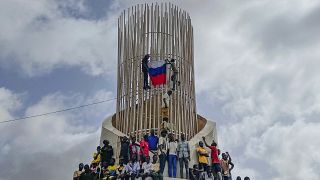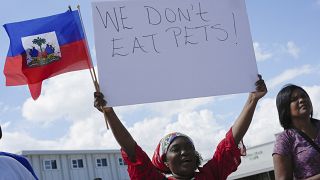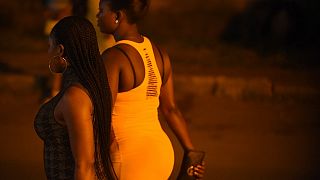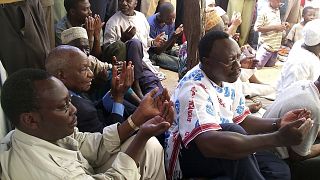Interview
The Africa-Europe Foundation is looking to take steps in advocating for bold ideas and actions to reshape Africa and Europe's common future together.
The Foundation which was launched in December last year, among others, seeks to unlock new opportunities to transform relations between the two continents.
Africanews had an exclusive conversation with the two Honorary presidents of the Africa-Europe Foundation.
Africanews' Ignatius Annor speaks to Ellen Johnson Sirleaf, former President of Liberia and Nobel Laureate from the Liberian capital, Monrovia. Mary Robinson is first woman President of Ireland and Chair of the Elders. She’s based in Dublin.
_You can watch the full interview in the video player above.
_
Ignatius Annor: Ambition is theme for the first Africa-Europe forum. That ambition includes accelerating social, economic and political change. Liberian activists have been making a case for a strong political will to stem systemic corruption. Critics point to lip service. How is the Foundation positioning itself to address issues like these?
Ellen Johnson Sirleaf: ‘’Liberia has a strong relationship. With European countries as to all of the African countries. And in the partnership relationship with those countries, it is clear that transparency and accountability is a requirement to ensure that activities supported and financed through this bilateral relationship is observed. But I'm glad that the Africa-Europe Foundation provides another opportunity to be able to stress the importance of fighting corruption. And we can use the Ibrahim Index of African governance, that tends to track the progress and the level of constraints of governance in all of the countries. ‘’
Ignatius Annor: Leaders on the continent are shifting to a more progressive partnership with global powers. Will the Africa-Europe Foundation provide a win-win scenario?
Mary Robinson: ‘’There is a need for a much more mature, equal partnership. And, you know, both continents are linked closely to each other and have never worked through a really in-depth partnership. Now at the forum. And that's just taken place, we had very key leaders like Kristalina Georgieva, the head of the International Monetary Fund, taking part in the whole health session because she knows, and has spoken openly about the importance for African countries of helping them to have the fiscal space for a recovery. She has the special drawing rights. She's urging countries to, you know, recognize that this isn't just a health issue. It's an economic issue. It's a crisis issue. It's an inequality issue.’’
Ignatius Annor: A staggering 33 million people face acute food insecurity in Africa, world vision says. How will the Africa-Europe agri-food partnership help to address this?
Ellen Johnson Sirleaf: ‘’There is an agriculture subgroup in the foundation that will, of course, be focusing on how we can, as the foundation can again grow more attention to this advocacy role, to being able to prioritize agriculture in our countries, focusing on the areas of most need. Invest best informal sector where most of agriculture activity takes place amongst women, women who have less than full access to the factors of production as relates to agriculture.’’
Ignatius Annor: The African Union and Africa CDC are concerned that vaccines donated to many African countries through COVAX are not recognized by EU travel certificate. You have an Africa-Europe Health Alliance on your agenda for the forum. Does this not undermine vaccine equality?
Mary Robinson: ‘’You know, our high level group, which Ellen and I are both on at the Africa Europe Foundation, shortly after the launch of the foundation, took the decision to make vaccine equity the subject of its first call to action. And the manifesto was co-signed by leading personalities across Africa and Europe. And is a basis for us, focusing on the political and policy action required. So if it is felt that the move to have this European passport, which still isn't fully clear if it becomes in any way a barrier, the Africa Europe Foundation will be on the case.’’
Ignatius Annor: In the post pandemic recovery, a key focus will be on redefining the role of cities as two-thirds of the global population are projected to live in cities by 2050. How will your partnership lead to improved well-being for urban dwellers?
Ellen Johnson Sirleaf: ‘’A key area for largely concentrated urban areas is energy. I have been meeting the Women Leaders Network, have been having sessions on energy, and we're talking about the clean cooking solution, something in which focus is brought to bear on the types of cooking, the types of methods for having energy, for cooking that needs to change, to move away from fossil fuels types of organizations to ensure that that we have solutions that take us away from coal, which is the one that is largely used in many of our communities, even in urban communities in Africa in countries.’’
Ignatius Annor: Finally, let me end with you Ma’am Robinson, what does the Foundation hope to achieve in the next five years for Africa and Europe?
Mary Robinson: ‘’Whether it’s for health, the climate crisis or other issues, the moment is now and we urgently need bold ideas and action to reshape Africa's and Europe's common future together. And these need to be inclusive. They need to be transgenerational. I'm a great believer in the inter-generational dialogue and sustainable way to address today's environmental, economic, social, health and technological challenges. And we're seeing the potential for a new chapter in Africa-Europe relations at the more political level helped a lot by this platform of platforms that can reach out and link open up and build more trust and face tough issues, honestly.’’










01:37
Record participation at 24th Sofi Great Ethiopian Run
11:05
Africa's hight cost of climate change [Business Africa]
01:17
COP29 finance talks lag as the summit reaches its halfway mark
01:38
COP29: What next for Africa's energy transition?
01:00
Civil society takes center stage at Brazil’s G20 social summit
01:58
Climate adaption: Unfulfilled pledges mean “lost lives and denied development” – UN chief